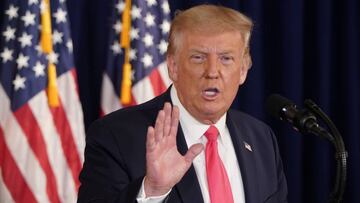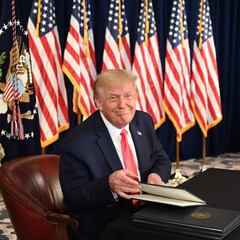Trump executive orders: could it be declared unconstitutional?
President Donald Trump's decision to bypass Congress and sign an executive order has drawn criticism from both sides of the U.S. political divide.

Donald Trump’s decision to sign an executive order covering payroll tax, evictions, unemployment benefits and student loans after talks between Republicans and Democrats over a new stimulus package broke down on 7 August has drawn criticism from both sides of the Senate floor after the announcement on Saturday of the U.S. president’s unilateral response to the inability of lawmakers to hammer out a deal amid the coronavirus pandemic.
- Trump signs executive order: what is included?
- Second stimulus check: how will negotiations continue?
- $400 unemployment benefit in Trump executive order
- $400 unemployment benefit: when does it start?
- $400 unemployment benefit: is it taxable?
"Unconstitutional slop"
Biden: Trump executive order to cut payroll taxes is "a reckless war on Social Security" https://t.co/2t3RgsbF5l pic.twitter.com/8Dq9Im5P1y
— The Hill (@thehill) August 9, 2020
Speaking on Fox News Sunday, House Speaker Nancy Pelosi described Trump’s decision to take matters into his own hands as “meager, weak and unconstitutional actions” that should serve to push Democrats and Republicans back to the negotiating table to reach consensus on the new stimulus package.
Senate Minority Leader Chuck Schumer echoed Pelosi’s opinion by describing the executive order as “unworkable, weak and far too narrow.”
Trump also drew the ire of Republican Senator Ben Sasse, who termed the president’s actions “unconstitutional slop.”
Trump's constitutional conundrum
Seeing lots of statements in my Twitter feed to the effect that Trump's executive orders are unconstitutional. I think that's wrong. Some of the EOs (technically, in 3 of 4 cases, presidential memoranda) are likely ineffective. Some may be unwise. They're not unconstitutional 1/
— Daniel Hemel (@DanielJHemel) August 9, 2020
Whether or not Trump’s decision to bypass Congress and sign the executive order is unconstitutional has been a topic of debate since the president flourished his pen at his golf club in Bedminster, New Jersey.
Constitutional experts have noted that the executive order and memorandums signed by Trump require the spending of federal funds, something that under the constitution falls within the remit of Congress not the president.
However, some legal experts have countered that Trump’s actions do not violate the statutes. Professor Daniel Hemel of the University of Chicago Law School said that while they may prove ineffective, they are not unconstitutional.
Democrats quiet on legal challenge
Larry Kudlow acknowledged on CNN that it's not clear whether states have the money to provide 25% of the additional unemployment benefits ordered by Trump.
— Axios (@axios) August 9, 2020
"We'll probably find that out today or tomorrow as we make our canvas." https://t.co/9Y9CycQXI0
Other observers wondered where the money would come from as Trump’s memorandum on unemployment benefits is based on tapping into $44 billion of disaster relief funds and obliging individual states already reeling from the economic effects of the Covid-19 crisis to cover $100 of every $400 provided in additional benefits.
While it remained unclear whether there would be formal legal challenges to Trump's orders, some legal and tax experts said his actions took few concrete steps to provide immediate relief even as Trump's economic aides defended them.
Pelosi declined to say whether Democrats would challenge the legality of Trump's actions in court. "Right now, we want to address the needs of the American people," she told CNN.
Executive Order 13768
Trump has suffered a legal reverse over an executive order during his presidency. In January 2017 the president signed Executive Order 13768 - Enhancing Public Safety in the Interior of the United States - which sought to cut off federal grants from sanctuary jurisdictions that refused to comply with immigration enforcement measures laid out by the U.S. Justice Department.
Related stories
Section 9(a) of that executive order was declared unconstitutional later the same year by Judge William Orrick III, who issued a nationwide permanent injunction against its implementation.
Trump also faced criticism in June when he issued an Executive Order on Preventing Online Censorship in response to Twitter’s decision to cite the president over a pair of tweets claiming mail-in ballots for November’s presidential elections would be “substantially fraudulent.”

